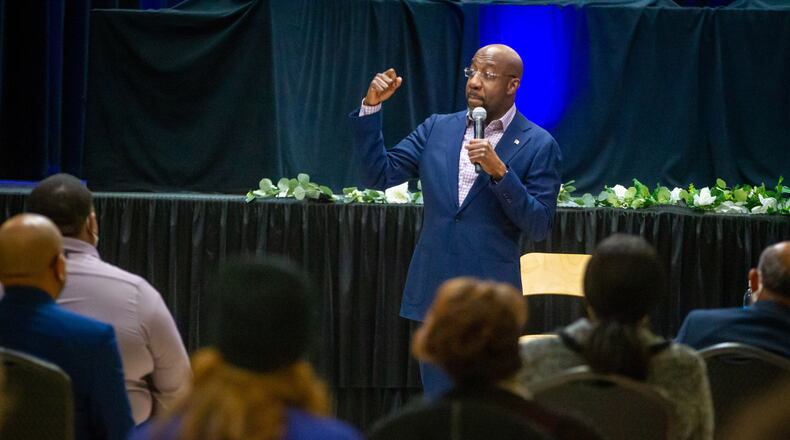U.S. Sen. Raphael Warnock said he chose to host his town hall meeting in DeKalb County so he could share his first-year accomplishments with some of the people who helped get him elected.
He spoke to the crowd of about 150 people about the legislation passed in Washington partially because of the Senate majority that Democrats gained when he and Jon Ossoff both won election in January 2021.
Warnock started with the $1.9 trillion American Rescue Plan, a coronavirus relief bill that became law in March without the support of any Republicans. He described some of its most popular provisions, including funding to get more people vaccinated and support for businesses and families.
“One of my colleagues called me as he was driving back home, and he said, ‘Raphael, I want to thank you for winning,’ ” he said. “Because of what Georgia did, we were able to do this.”
Republicans’ objections to the coronavirus relief plan included its expense and potential impact on the deficit. Some have also said it was stuffed with liberal priorities that have nothing to do with pandemic relief.
Warnock then moved on to the $1.2 trillion infrastructure package that passed with bipartisan support and will help improve roads, bridges and transit systems across the country. He focused on the amendment he championed alongside Texas Republican U.S. Sen. Ted Cruz to prioritize a highway that will help connect some of Georgia’s midsize cities and military bases. He said he was able to find common ground with one of the Senate’s most conservative members.
“My job as a senator and I believe all of our jobs, particularly in the midst of a pandemic, is to find a road that runs through our humanity, find ways to connect to one another to get the things that we need to get done in order to prepare a future that is worthy of all of our children,” he said.
The senator also admitted there are things he still wants to accomplish, including work on criminal justice, reducing student loan debt and passing federal voting legislation. Even though election bills have stalled in the Senate, he said, he hasn’t given up.
“I’m going to keep fighting to deal with dark money in our politics,” he said, referring to political contributions from donors whose identities are not disclosed. “I’m going to keep fighting to deal with racial and partisan gerrymandering. I’m going to keep fighting against those who are trying to make it harder, rather than making it easier, for people to vote.”
Warnock also answered roughly a dozen questions from members of the audience who were selected randomly. The questions touched on issues such as access to mental health care, abortion — Warnock supports abortion rights — and whether he believed Congress could pass some form of the Build Back Better social spending and climate change bill.
He had answers for each inquiry except one regarding whether he supported the Buckhead cityhood campaign. Warnock declined to weigh in, saying it was a local issue but adding he will work with any city leader to ensure municipalities have resources to address crime and other issues.
Jennifer Zenteno, a 28-year-old North Druid Hills resident, identified herself as a young immigrant who was brought to the country illegally as a child and has been shielded from deportation by the Deferred Action for Childhood Arrivals program. She said she is frustrated that Congress has failed to pass a law providing a pathway to citizenship. Zenteno mentioned she had a 2-year-old son, and Warnock replied that he was a father also and wanted to be a “moral voice” in Washington on immigration.
“I do feel like his answer was genuine,” Zenteno said after the meeting. “I did feel that connection with him. And so, I do trust the senator is doing everything he can to protect people like myself.”
MORE DETAILS
Want more politics news? Get the latest news and in-depth coverage from the Georgia Legislature, political campaigns, and state issues on ajc.com/politics.
About the Author
Keep Reading
The Latest
Featured




